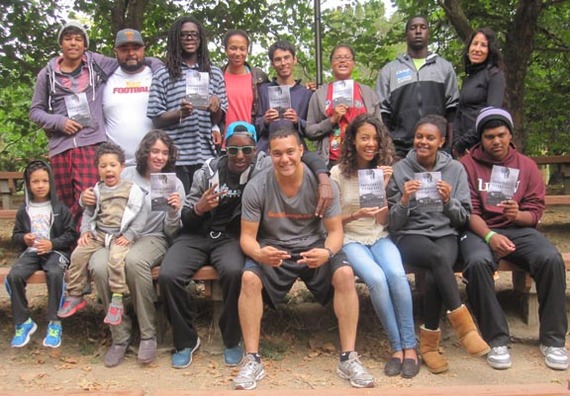
Poet-in-Residence Aaron Samuels at Camp Be'chol Lashon
As we head into the Jewish New Year, we take with us the challenges of an eventful summer punctuated by racial unrest. The death of Michael Brown, like that of Oscar Grant and Trayvon Martin before him, are tragedies that jolt us out of complacency.
Dealing with the complexity of race means acknowledging difficult realities and Jewish tradition teaches us to lean into rather than shy away from complexity. Sitting with challenges, examining our biases, and asking questions are the essence of the Jewish New Year.
Although there is talk of a "post racial" America in the wake of the election of a black president, Ferguson is a reminder that we have not yet achieved that state. In 1903 WEB DuBois asserted, "The problem of the twentieth century is the problem of the color-line." Over a century later, the color-line has been blurred but not erased and we need to come to terms with the implications. DuBois furthered observed that "the secret of social progress is understanding the social forces which move and modify your age." What are those forces today and how should they inform 21st century Americans?
Much of the Jewish media coverage of Ferguson linked the current events to the civil rights era, with images of blacks and Jews marching together. Despite the unifying messaging, the underlying implication is that Jews exist only on one side of the "color-line." Even though the majority of Jewish immigrants to America hailed from Eastern Europe, perpetuating the stereotype that Jews are only white implies that being black and being Jewish are mutually exclusive. They are not.
The American paradigm is shifting. With taboos around interracial marriage declining, the fastest growing demographic group is mixed-race youth. Social commentator Touré makes the case that that there is a profound shift in how post civil rights generations think about race -- they are "post-black" meaning that younger generations take equal rights and integration for granted and enjoy unprecedented agency in defining their identities. A similar analogy can apply to younger generations of Jews. What does this mean for race relations?
It cannot be that the only time Jews reference race is around incidents of gross injustice, while the rest of the time, even the well intended pretend to be "colorblind." When MLK said "I have a dream that my four little children will one day live in a nation where they will not be judged by the color of their skin," he did not mean his children's identity should be ignored.
Although a vision of a world where the color of one's skin is a noble ideal, in reality, colorblindness may achieve the opposite of what is intended. Research reveals whites often avoid racial conversations out of fear that they may say something politically incorrect. Are we racist or just afraid of messing up? Many Jews are on the forefront of pluralism, tolerance and inclusion, yet why is race is still considered the "third rail?"
The unintended consequence of a color-blind approach is that racism remains "unexamined and intact " according to Berkeley professor John Powell. If race is a social construction, how are we actively constructing race today? Even as the Jewish community becomes more diverse, systemic change is slowed by an inability to actually engage the difference that we see around us.
Without diminishing the importance of the historical Black-Jewish alliance, our past and current support of civil rights does not absolve us of the responsibility to wrestle with what race means in our lives on a day-to-day basis. Important issues are not resolved by ignoring them.
The rituals around the New Year offer a universal model for self-reflection and change -- focusing energy for the sole purpose of betterment and transformation. The Shofar serves as a wake up call meant to jolt us out of complacency. It's a call to action. Yom Kippur's genius is not just paying lip service to doing the right thing, we have to literally reach out to others to ask forgiveness. Rabbi Jonathan Sacks says, "It's a day of radical responsibility, when we blame no one but ourselves, and we try to make amends and begin again."
If it's difficult to know where to begin to grapple with race, take Pirkei Avot's advice -- if not now, when? Challenge yourself to explore new or unfamiliar media, books, magazines, films and recipes. In a world that is connected through social media and technology, knowing how to encounter the 'other' is an increasingly important skill. The High Holidays provide useful tools to gain cultural competency -- an ongoing process that encourages continual learning, self-reflection and growth.
We need to close the gap, bringing our commitment to civil rights forward into the 21st century. As increasing number of Jewish families are multicultural, how we talk about and deal with race carry implications for the Jewish future. This Jewish New Year, as we engage in Cheshbon Nefesh or "accounting of the soul" -- to transform ourselves into the people we want to be -- push your understanding of Jewish and race.
